Lists
by Jeremy Garber, November 12, 2020 8:24 AM

This year, perhaps especially, it is easy to see just how small and interconnected our world really is. 2020, despite its myriad challenges, dramas, heartaches, tragedies, and hard-won battles, has proven to be one when historically marginalized voices received the wider attention, amplification, and critical ear they have always deserved (and have had to fight so vehemently for). So it is with books, too. Increasingly, readers are turning to tomes written by authors who share backgrounds, perspectives, and stories different from their own.
Research from psychologists has shown a link between reading literary fiction and the deepening of a reader’s capacity for empathy, as it allows us to better understand other human beings — as well as what it may be like for them to navigate our shared world.
Though exact figures are not available, it is estimated that less than one percent of all the books published in English in any given year are literary fiction or poetry titles originating in languages other than English. There are currently about 7.5 billion people alive today on this pale blue dot we each call home, yet only about 350 million of us report English as our native language — less than five percent of the world’s population.
Literature in translation, however, continues to gain an ever-greater foothold in the reading habits of Americans (though we still have so very far to go!). Over the past decade or so, more and more publishers are offering English-speaking readers a variety of works available in English translation. Some smaller (and often not-for-profit) publishers devote their seasonal lists entirely to translated fiction. Given the additional steps (and costs) associated with bringing a translated work to the American reading public, it’s safe to presume that most of these books are among the finest being published in any given year, in any language — or else they never would have been translated and brought ashore in the first place.
Whether you are hoping to diversify your own library (or your gift list!), explore books beyond your ordinary tastes, or travel the world vicariously by filling up your literary passport, opportunities for broadening your reading are truly legion. To that end, below is a list of 14 books, all newly released in English translation this year, featuring authors from five different continents. Several of these books have won major awards in their home countries (and others are up for awards in this country), but all of them may be counted amongst the year’s finest fiction. The talent, imagination, and unique perspectives on display in each of these works are quite breathtaking. So, if you’ve never read a Kenyan epic, or a collection of Korean short stories, or an unforgettable Colombian novel, embark now and experience just how multitudinously rewarding the literary world truly is (and be sure to give thanks to the wonderful translators who make such voyages possible in the first place). Quite literally, the whole world awaits!
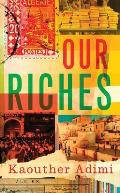 Our Riches
by Kaouther Adimi
Our Riches
by Kaouther Adimi
Kaouther Adimi's Our Riches (translated from the French by Chris Andrews) is the story of Edmond Charlot, Algerian publisher and bookshop owner, credited with discovering a young Albert Camus. Based on historical fact, Adimi's charming novel spans some 80 years and is a tale of struggle, politics, community, culture, independence, and, maybe above all, the love, promise, and enduring nature of all things bookish. Thoughtful and beautifully written (and even occasionally funny!), Adimi's novel evokes the lasting spirit of other bibliocentric novels like Bohumil Hrabal's Too Loud a Solitude and Helene Hanff's 84, Charing Cross Road.
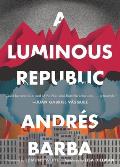 A Luminous Republic
by Andrés Barba
A Luminous Republic
by Andrés Barba
A Luminous Republic (translated from the Spanish by Lisa Dillman) is the fifth of Andrés Barba’s books rendered into English — and is quite nearly flawless. Recipient of the prestigious Premio Herralde, Barba’s new novel is a tense, foreboding, and unforgettable work. The unease and dread that so characterized his previous book, Such Small Hands, is even more abundant, making A Luminous Republic easily his finest outing to date. Dark and dismaying, Barba's allegorical tale of violence, terror, neglect, and turmoil exposes both a social fragility and the ever-unintended consequences of dehumanization and disregard.
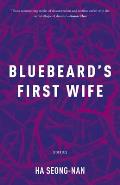 Bluebeard’s First Wife
by Ha Seong-nan
Bluebeard’s First Wife
by Ha Seong-nan
The new collection of short stories from Korean author Ha Seong-nan, Bluebeard's First Wife (translated from the Korean by Janet Hong), delights and disquiets as much as its exceptional predecessor, Flowers of Mold. Featuring 11 new stories, Ha again offers a selection of short fiction where things are frequently more ominous than they first appear. With their seedy underbellies, a readerly presumption of intentions dastardly (or worse), and very real human yearnings, Ha's tales so effortlessly, so beautifully blend the macabre and the mundane.
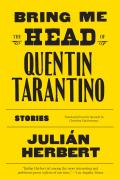 Bring Me the Head of Quentin Tarantino
by Julián Herbert
Bring Me the Head of Quentin Tarantino
by Julián Herbert
The 10 stories in Mexican author Julián Herbert’s new collection, Bring Me the Head of Quentin Tarantino (translated from the Spanish by Christina MacSweeney), offer a hearty/heady dose of narcoviolence, sex, and an almost absurdist imagination. Herbert’s strong prose, acerbic wit, and unflinching foray into peripheries funny, fantastical, and ferocious mirror the darkness of a world increasingly out of control. A must-read for fans of Roberto Bolaño and Santiago Gamboa’s fiction, Bring Me the Head of Quentin Tarantino juxtaposes the zany and the sincere.
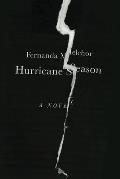 Hurricane Season
by Fernanda Melchor Hurricane Season
by Fernanda Melchor
Fernanda Melchor's English debut, Hurricane Season (translated from the Spanish by Sophie Hughes), was shortlisted for the International Booker Prize and longlisted for the National Book Award for Translated Literature. Written with unflinching ferocity and propulsive prose, Hurricane Season is an unrelenting torrent of violence, barbarity, recrimination, sex, greed, trauma, corruption, neglect, fear, lust, deceit, baseness, and the insidiousness of evil — making it simultaneously both scintillating and suffocating. The Mexican author’s new novel possesses an inescapable inertia and her thematic confrontation of malevolence and forever-stymied attempts at redemption combine to create a remarkable, indelible, if brutal, work of art.
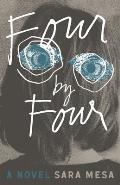 Four by Four
by Sara Mesa
Four by Four
by Sara Mesa
A dark, foreboding novel of shadow, insinuation, and institutional depravity, Sara Mesa’s Four by Four (translated from the Spanish by Katie Whittemore) is the tale of fictional Wybrany College, where the progeny of both the well-to-do and the needy comingle — and where everything seems just ever so slightly off. With its eerie tableaus, perfect pacing, and suspenseful storytelling arc, Mesa’s story is at once deeply unsettling and uncannily realistic. Exposing it all for the world at-large to see, Four by Four reveals the thin veneer of venerability to be hiding something altogether menacing and utterly unforgivable.
 That Time of Year
by Marie NDiaye
That Time of Year
by Marie NDiaye
The underlying sinisterness that pervades nearly all of Marie NDiaye's fiction is absolutely irresistible. Set in a provincial town well outside of Paris, That Time of Year (translated from the French by Jordan Stump) is the story of Parisian math teacher Herman, whose wife and child go missing during their final days of summer holiday. Are the townsfolk messing with him on purpose? Are they all involved in some malevolent plot? Why does everyone, including the mayor, have such a nonchalant attitude toward Herman and his missing family? NDiaye’s newest novel is another expertly crafted tale rich in eerie atmospherics.
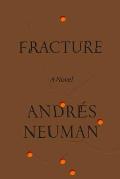 Fracture
by Andrés Neuman
Fracture
by Andrés Neuman
The resplendent beauty of Andrés Neuman’s prose, the thoughtful, reflective nature of his ideas, and the depth and vulnerability of his characters coalesce to make his writing among the finest in the world. His new novel, Fracture (translated from the Spanish by Nick Caistor and Lorenza Garcia), is the story of Yoshie Watanabe, survivor of the Nagasaki and Hiroshima bombings both — and stranger to neither loss nor love. Spanning decades and continents, Fracture reckons with fragility and breakage, deftly employing the Japanese art of kintsugi as metaphor in a masterful, tenderly told tale.
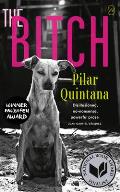 The Bitch
by Pilar Quintana
The Bitch
by Pilar Quintana
Finalist for the 2020 National Book Award for Translated Literature, Colombian writer Pilar Quintana's The Bitch (translated from the Spanish by Lisa Dillman) is a taut, terse tale of guilt, shame, and frustrated desire. Quintana’s slim, yet powerful story is sparse on the prose, yet plentiful in its impact. As violence and brutality abound, The Bitch lays bare the precipitous emotional and existential toll accumulated resentment and thwarted ambitions inevitably exact. The Bitch is a tough, even tender take (despite the cruelty) on one woman’s yearning, bitterness, regret, and grief.
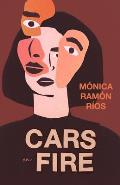 Cars on Fire
by Mónica Ramón Ríos
Cars on Fire
by Mónica Ramón Ríos
An eclectic, sensational collection of short fiction, Chilean author Mónica Ramón Ríos's Cars on Fire (translated from the Spanish by Robin Myers) is suffused with death and violence and writerly lives and perspectives askew. There is a tantalizing charm to Ríos's writing, as well as a focus on the marginalized and maligned, offering recompense to those so often forsaken and rejected (or worse).
 Tokyo Ueno Station
by Yu Miri
Tokyo Ueno Station
by Yu Miri
A doleful, ethereal, even diaphanous tale of the forgotten and forlorn, Yu Miri's Tokyo Ueno Station (translated from the Japanese by Morgan Giles) — a finalist for the 2020 National Book Award for Translated Literature — conjures considerations of class, loss, memory, history, and societal indifference. Kazu has already shuffled off this mortal coil, but he must, even in death, endure more suffering still (after losing his career, his home, his wife, and his children). Yu’s short novel offers a melancholic glimpse into the battered spectral remains of a man worn down by so many of life’s indignities.
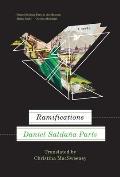 Ramifications
by Daniel Saldaña París
Ramifications
by Daniel Saldaña París
Daniel Saldaña París's Ramifications (translated from the Spanish by Christina MacSweeney) is the second of the Mexican author's novels rendered into English (after his stupendous debut, Among Strange Victims). A more serious, somber story than his first, Ramifications is a work of maternal abandonment, emotionally stunted adulthood, and the search for truth. Reckoning with the legacy of his mother's disappearance some 23 years prior, Saldaña París's bed-bound protagonist recalls his broken youth, his pre-teen escapism (origami and a closet), and his own desperate efforts to fit in. Compassion and melancholy comingle to create a moving portrait of the shut-in as a young man.
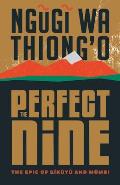 The Perfect Nine
by Ngugi wa Thiong'o
The Perfect Nine
by Ngugi wa Thiong'o
Kenyan author Ngugi wa Thiong'o's new novel, The Perfect Nine, is a dazzling retelling of the Gikuyu origin myth (Kenya's largest ethnic group), interpreted and translated into English by Ngugi wa Thiong'o' himself. An exuberant epic entwining storytelling-in-verse and edifying mythology, The Perfect Nine is an action-packed, adventurous fable abounding with joy and wisdom. Rich, memorable, and magnificently composed, Ngugi wa Thiong'o's newest is a significant addition to the worldwide folklore canon — and an altogether rewarding read.
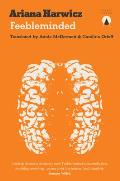 Feebleminded
by Ariana Harwciz
Feebleminded
by Ariana Harwciz
Ariana Harwicz has an almost preternatural aptitude for creating fiction that envelops, suffocates, and refuses to relent. Even more feverish than her previous (and already frenetic!) book, Die, My Love, Harwicz’s new one, Feebleminded (translated from the Spanish by Annie McDermott and Carolina Orloff), is a depraved tale of vengeance and mother-daughter dysfunction. Unrelenting and unforgettable, the Argentine author’s latest novel is a breathtaking, hectic ride, as well as a strangely exhilarating story that confirms her as one of the most formidable writers at work today.
|